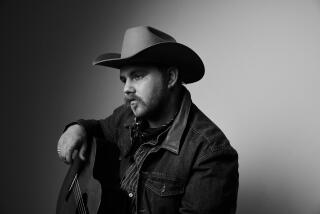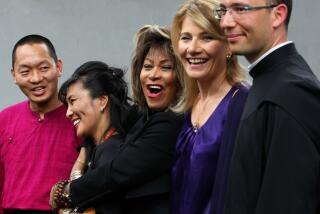Chanting Keeps Ernestine Anderson’s Career on Key
- Share via
Four words saved Ernestine Anderson’s singing career.
They are not words most of us hear every day: Nam Myoho Renge Kyo. To those who practice the Nichiren Buddhist religion, however (and they include Herbie Hancock among other musicians), this chant had a special significance.
Anderson’s life in music had moved upward slowly during the 1950s and down precipitously in the ‘60s. A hit album she had recorded in Sweden in 1958 crossed the Atlantic; soon Time magazine was calling her “the best new singer in the business.” But after a few more records with diminishing sales and a couple of years living in England, her work opportunities ground to a halt and she found herself taking day jobs.
“Meanwhile, though,” the Houston-born singer recalls, “I had become a practicing Buddhist, and I started praying for a chance to get back on records. Sure enough, not long afterward I got a call from Benny Carter to do an album with him.”
Praised by Carter for the honesty and conviction of her sound, she eventually landed a contract with Concord Records. In the last decade she has produced a long series of free-swinging LPs, one of which, in 1981, included the slightly raunchy blues “Never Make Your Move Too Soon.” It gained major airplay; the calls for club and festival dates picked up.
Tonight at the Hollywood Bowl Anderson’s life, in a sense, will have come full circle: She will be heard as a special added attraction with the Lionel Hampton orchestra. It was as Hampton’s band vocalist that she first attracted attention in the early 1950s.
Despite the obvious temptations, Anderson has never sacrificed her image as an uncompromising jazz singer, with a resourceful ear for unconventional popular songs and a deep feeling for the blues (one of her best albums was the blues-oriented “When the Sun Goes Down”). Because of prevailing conditions in the music world, though, she is beginning to have slight reservations about her stand.
“Jazz artists on the whole are still not getting the proper exposure,” she says. “Compared to people in the pop field, they are still at the dues-paying stage; they have to do it for the love of the music rather than to make a living at it. Jazz is just not a form of music that attracts too many young singers; there’s not enough incentive for them.”
Asked about Diane Schuur, who like Anderson is Seattle based, she said: “I’ve known her for years; she’s a good friend and a good singer. She has sort of crossed the line, and that’s fine for her. Dianne Reeves also leans toward the commercial, and I’m not saying this is a bad thing. In fact, sometimes I wonder whether I’m doing the right thing myself.”
Whatever her momentary misgivings, life is running smoothly. True, there is little work on her home turf, except for a Seattle club once a year and the annual jazz festival in nearby Bellevue, Wash. Aside from this, though, her bookers keep her, as she puts it, “hopping pretty steadily on the road.”
In general, her career is spiraling upward. “I have had capacity houses at places like the Charles Hotel in Cambridge, Mass., and the Blue Note in New York. The records are getting great radio play.
“It’s not that I don’t do as much as I want to, but I’d like to concentrate less on clubs and do more concerts. After all, you can reach as many people in one or two nights at a good-size hall as you do in a whole week at a club.”
As she points out, even when working conditions are less than ideal, a concert can be a rewarding experience. “A couple of weeks ago I was at the Chicago Jazz Festival, a city-sponsored outdoor event, and it was raining. A great gust of wind came up and blew rain on the stage. To my amazement, the people stayed. Herbie Hancock and I were the closing acts and they waited patiently in the rain.”
Concerts can sometimes pay off in prestige rather than cash. “I’ve been invited by Gov. Booth Gardner to appear at the ‘Best of Washington State’ gala.”
Anderson has never given up the chanting that she feels turned her life around almost 20 years ago.
“I still try to chant three hours a day. I’m not always successful at that, but I do try for a minimum of an hour.”
More to Read
The biggest entertainment stories
Get our big stories about Hollywood, film, television, music, arts, culture and more right in your inbox as soon as they publish.
You may occasionally receive promotional content from the Los Angeles Times.










